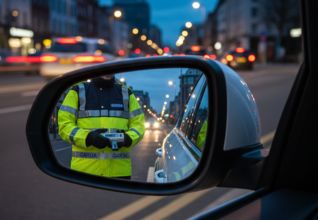Driving under the influence of drugs has been a road traffic offence in Ireland since 1961. However, in recent years, it has become a major road safety issue in Ireland and is now considered just as prevalent and dangerous as drink driving.
Driving with any amount of drugs or alcohol in your system can significantly impair your ability to control a vehicle, reaction times, attention and judgment. Putting not only the driver at risk, but also any passengers and every other road user.
To combat this, An Garda Síochána has enhanced powers to detect drug drivers. Below, we will look at exactly what these tests involve, the severe penalties for failing one and how the law applies to prescription medication.
What is Drug Driving?
Drug driving is the act of operating a vehicle while your ability to do so is impaired by any drug. This is not limited to illegal substances like cannabis, cocaine, or heroin. It also applies to legal prescription medicines and over-the-counter products if they affect your driving performance.
A drug can impair your cognitive and motor skills, slow down your reaction times, and affect your perception of speed and distance, making you a danger on the road. Under Irish law, it is an offence to drive while impaired by any drug, or to be above a specified legal threshold for certain drugs, regardless of impairment.
Drugs that can impair your abilities and affect safe driving include:
- Cannabis
- Cocaine
- Heroin (and other opiates)
- Benzodiazepine (valium)
- Amphetamines (including methamphetamine and MDMA)

Drugs and Driving: The Risks
Many drug drivers incorrectly assume that certain drugs make them better drivers and see themselves as being at low risk of a collision. Likewise, due to the effects of the drugs in their system, many drug drivers overestimate their driving ability, or underestimate the impairing effects of drugs leading to bad decisions while behind the wheel.
Driving with even small quantities of drugs in your system can seriously impact your reaction speed, co-ordination, perception, attention, and judgement while driving. Making you a danger to yourself, passengers and any pedestrians who are also using the roads.
Data from the Medical Bureau of Road Safety (MBRS) shows that in 2021, out of 4,321 samples tested by the MBRS for drugs, 78% of specimens tested positive for at least one impairing drug. With the most common drugs detected in drivers were cocaine, cannabis and benzodiazepines.
While analysis of coroner data for road fatalities that occurred between 2013-2017, and where a toxicology result was available, found that:
- 11% of driver fatalities tested positive for at least one benzodiazepine.
- 10% had a positive toxicology result for cocaine.
- 7% had a positive toxicology result for cannabis.
- 7% had a positive toxicology result for at least one opioid.
Drug Driving in Ireland and the Law

In Ireland, it is against the law to drive under the influence of drugs, or prescription drugs, if your driving is impaired to the point that you do not have control over your vehicle.
It is also illegal to drive under the influence of certain drugs above specified levels, regardless of impairment. This includes cannabis, cocaine and heroin. If you are found to have any of these drugs in your system while driving, you can be prosecuted for drug driving without proof of impairment.
Under the Road Traffic Act, An Gardaí have discretionary power to carry out preliminary drug tests at the roadside if they suspect a driver may be under the influence. Gardai regularly conduct preliminary drug testing at Mandatory Intoxicant Testing (MIT) checkpoints where they can test for drugs or alcohol.
If you are stopped by a Garda at a Mandatory Intoxicant Testing (MIT) checkpoint or following an incident, you may be asked to take a preliminary drug test. This is done using a device that tests a sample of your saliva. It is an offence to refuse to provide a saliva sample.
Gardaí may also carry out an impairment test at the roadside to assess whether a driver’s ability is impaired. This test involves five parts to judge a driver’s impairment.
- A pupil dilation test
- Modified Romberg balance test
- Walk and turn test
- One-leg stand test
- A finger-to-nose test
In certain cases, such as when a driver is suspected of driving under the influence, An Garda may request you be brought to a Garda station to undergo a blood test.
Under new laws brought in in May 2024, any driver that has been involved in a serious car accident must be tested for drugs at the scene. Gardaí will test drivers at the roadside and ask them to remain until the test shows a positive or negative result. This generally takes about 8-10 minutes after giving a sample, but the Gardaí may ask you to wait up to 30 minutes.
Gardaí already carry out drink driving mandatory tests for drivers who have been involved in a crash where someone has been injured, or of a driver who has been injured and removed to hospital.
Penalties for Drug Driving
The penalties for drug driving in Ireland are severe and include mandatory disqualification from driving, hefty fines, and potentially a prison sentence. If you are convicted of drug driving, you can expect to face:
- a minimum 1-year driving ban if you are found to be above the legal threshold for cocaine, cannabis or heroin.
- a minimum of 4 years driving ban if you are found to have drugs in your body and are impaired to a point where you do not have proper control of the vehicle.
- Fines of up to €5,000
- A criminal record.
Additionally, a conviction for drug driving can have a serious impact on your car insurance. Insurance companies will most likely It will likely view you as a higher risk, which can lead to substantially higher car insurance premiums, and may take longer to process.
Taking Medication and Driving
Many drivers are surprised to learn that they can test positive for drug driving even if they have never taken an illegal substance. The law applies to any drug that impairs your ability to drive safely, including those prescribed by a doctor or bought at a pharmacy.
Common medicines that can cause impairment include those containing codeine, found in certain painkillers, and some antihistamines or cold and flu remedies which can cause drowsiness.
However, if you are taking prescription or over-the-counter medications as intended under the advice from your doctor or pharmacist then you should have nothing to worry about.
If you are taking medication, do not stop taking it without medical advice. Instead, speak to your doctor or pharmacist about whether it could affect your driving. Always read the patient information leaflet, and if a medicine makes you feel drowsy, dizzy or unable to concentrate, do not drive.
Statutory medical exemptions are provided in the law for people who have been prescribed medicinal cannabis or cannabinoids in Ireland. However, drivers are should carry their medical certificate with them while driving.
Drug Driving in Ireland: Our Thoughts
Drug driving is a serious crime with potentially devastating and life altering consequences. Whether it is an illegal substance or a legal medicine that impairs your driving, the risk to yourself and others is the same.
And, with the new roadside testing powers, you are more likely than ever to be caught. The only safe choice is never to drive if you are under the influence of any substance that could affect your ability to control your vehicle.
Frequently Asked Questions
Drug Driving in Ireland
Looking to Save On Your Car Insurance?
At KennCo, our car insurance cover offers competitive rates and valuable benefits, including a replacement car as standard. Get peace of mind knowing you’re fully covered.
Get a Secure Quote Today
